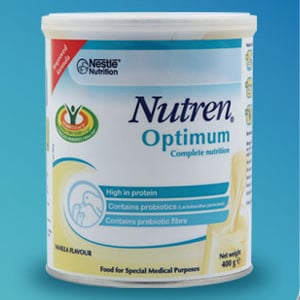
You can see how they are affected. You are a witness to the immense struggle they go through to regain the fitness and health they once took for granted. They have medications for pain and physiotherapy for rebuilding muscle, but do they have the nutrition their bodies need to recover, fight off further complications and give them the strength they need to carry on?
Injury and illness can suppress the immune function
Injury and illness affects both nutritional status and immune function. The insult of trauma, surgery and infection can result in the development of nutritional deficiencies and suppression of the immune system. (1-4) These, in turn, can increase the time it takes to recover and increase the risk of developing further complications. (1,5)
The effects of injury and illness on nutritional status and immune function can be viewed in the light of several changes in both body function that occurs in response to the insult:
• Inactivity or prolonged bed rest – this results in protein loss, muscle wasting and weight loss, which will reduce physical activity and immune responses (5,6,7)
• Anorexia (loss of appetite) – this leads to a decreased food and protein intake, with resultant nutritional deficiencies and reduced immune function (3,6)
• Release of stress hormones – after trauma, surgery or stress cortisol levels increase and can accelerate muscle loss and suppress the immune system (1,5)
• Fever – results in an increased demand for nutrients and an increased loss of protein that is proportional to the number of days that the fever is present (6)
• Increased energy requirements – after stress, trauma or sepsis there is a significant increase in the body’s energy requirements and this can result in a negative energy balance and a depletion of essential nutrient stores. (3,4) The body’s ability to use glucose and fat is impaired and so muscle is broken down for fuel. (4)
The nutritional recovery phase can last 2-3 times longer than the length of the illness
It can take two to three times the duration of the illness to replace the protein lost during an illness. (6) Even in mild fever lasting 3 days it takes 10-11 days to replace the protein lost with a normal diet and with a more severe illness such as diarrhoea the nutritional recovery phase can last for 2 to 3 weeks. (6)
Nutrition forms an essential part of recovery
Maintaining a healthy diet is an essential contribution to aiding their recovery. The body needs a well balanced diet with extra energy and protein, usually in the form of build-up drinks or nutritional supplements, to help with healing and recovery. (8) The benefits of nutritional support include:
• Improvement in immune function (3,4)
• Reduction of risk for further illness (4)
• Prevention of muscle wasting (4)
• Improved oxidation function to limit the damaging effects of inflammation (through the action of immunonutrients and antioxidants like vitamin A & C, selenium, zinc. (3)
Caring for someone recovering from illness or injury means giving them strength as well as support. Nestlé Nutren Optimum is a nutritional supplement designed to respond to the nutritional and immune challenges after illness or injury. It contains vitamins, nutrients and proteins as well as pre- and probiotics known to aid digestive health and enhance immunity. It is the meal in a glass that gives them the strength to carry on.
Nestlé Nutren Optimum is available at retailers and pharmacies countrywide. For delicious recipes using Nestlé Nutren Optimum or more information about the product visit www.nutren.co.za.
References:
1. Marik PE, Flemmer M. The immune response to surgery and trauma: Implications for treatment. J Trauma Acute Care Surg 2012;73(4):801-808.
2. Snyder GL, Greenberg S. Effect of anaesthetic technique and other perioperative factors on cancer recurrence. Br J Anaesthesia 2010;105(2):106-115.
3. Grimble RF. Basics in clinical nutrition: Immunonutrition – Nutrients which influence immunity: Effect and mechanism of action. e-SPEN 2009;4:e10-e13.
4. O’Leary MJ, Coakley JH. Nutrition and immunonutrition. Br J Aneasthesia 1996;77:118-127.
5. Paddon-Jones D, Sheffield-Moore M, Cree MG, et al. Atrophy and Impaired Muscle Protein Synthesis during Prolonged Inactivity and Stress. J Clin Endocrinol Metab 2006;91(12):4836-4841.
6. Kurpad AV. The requirements of protein & amino acid during acute & chronic infections. Indian J Med Res 2006;124:129-148.
7. Evans WJ. Skeletal muscle loss: cachexia, sarcopenia, and inactivity. Am J Clin Nutr 2010;91(suppl):1123S-1127S.
8. The Hillingdon Hospitals. National Health Services (NHS). Recovery after Critical Illness: Information for patients. [Online] [cited 2013 Apr 16]. Available from: URL: http//www.thh.nhs.uk/…/PIID180_Recovery_after_Critical_illness_May14.pdf.




 Publications
Publications
 Partners
Partners













